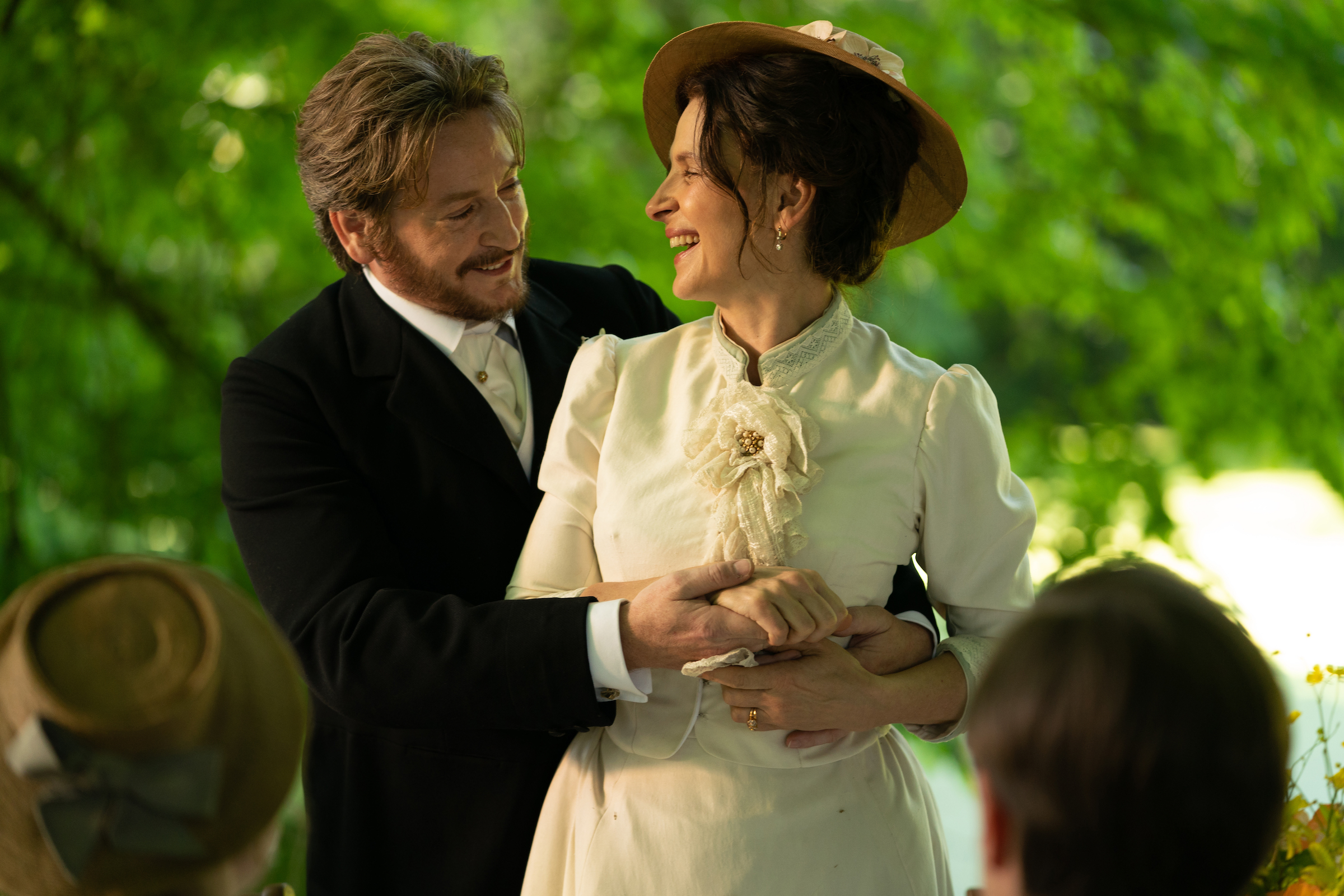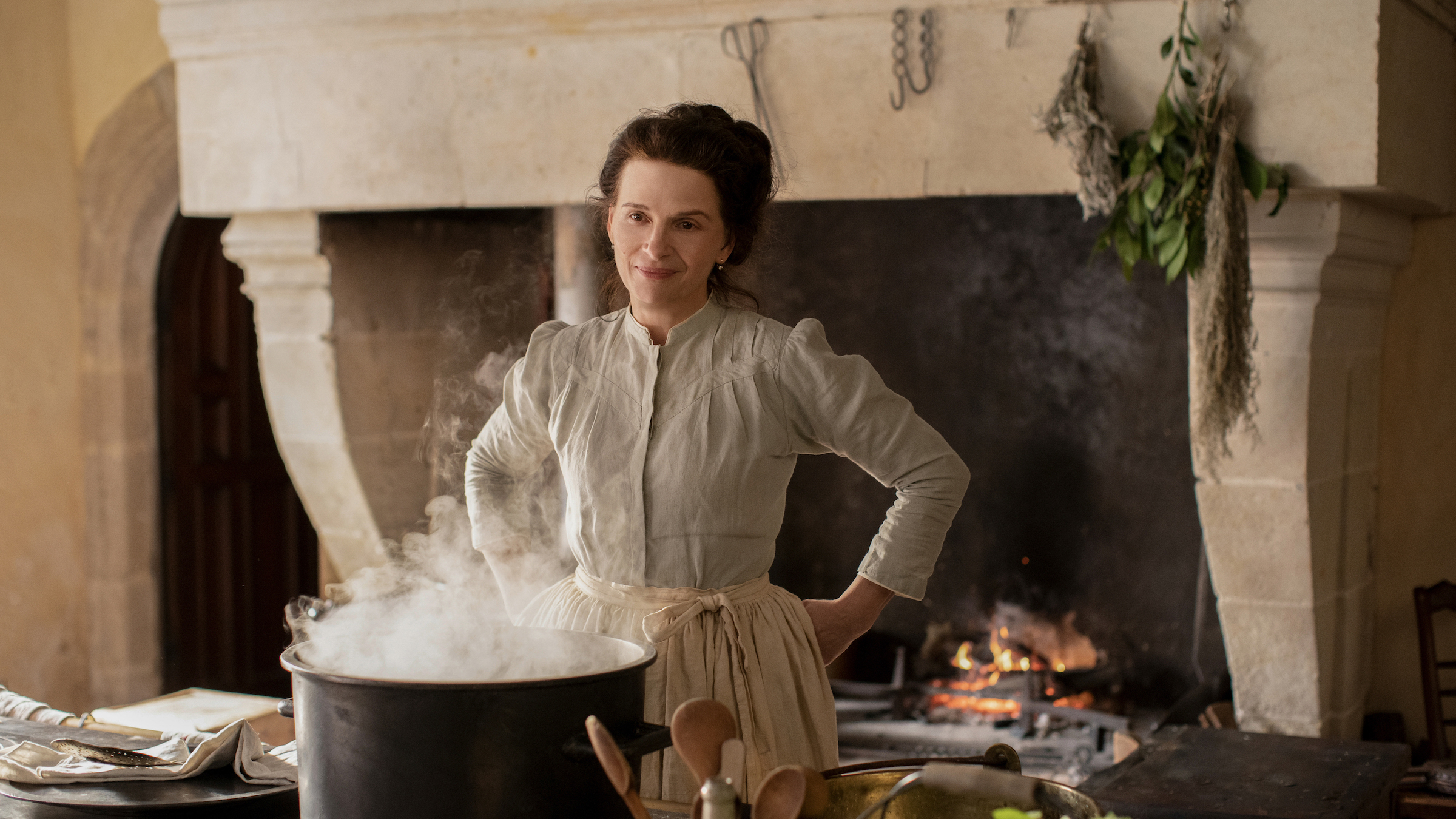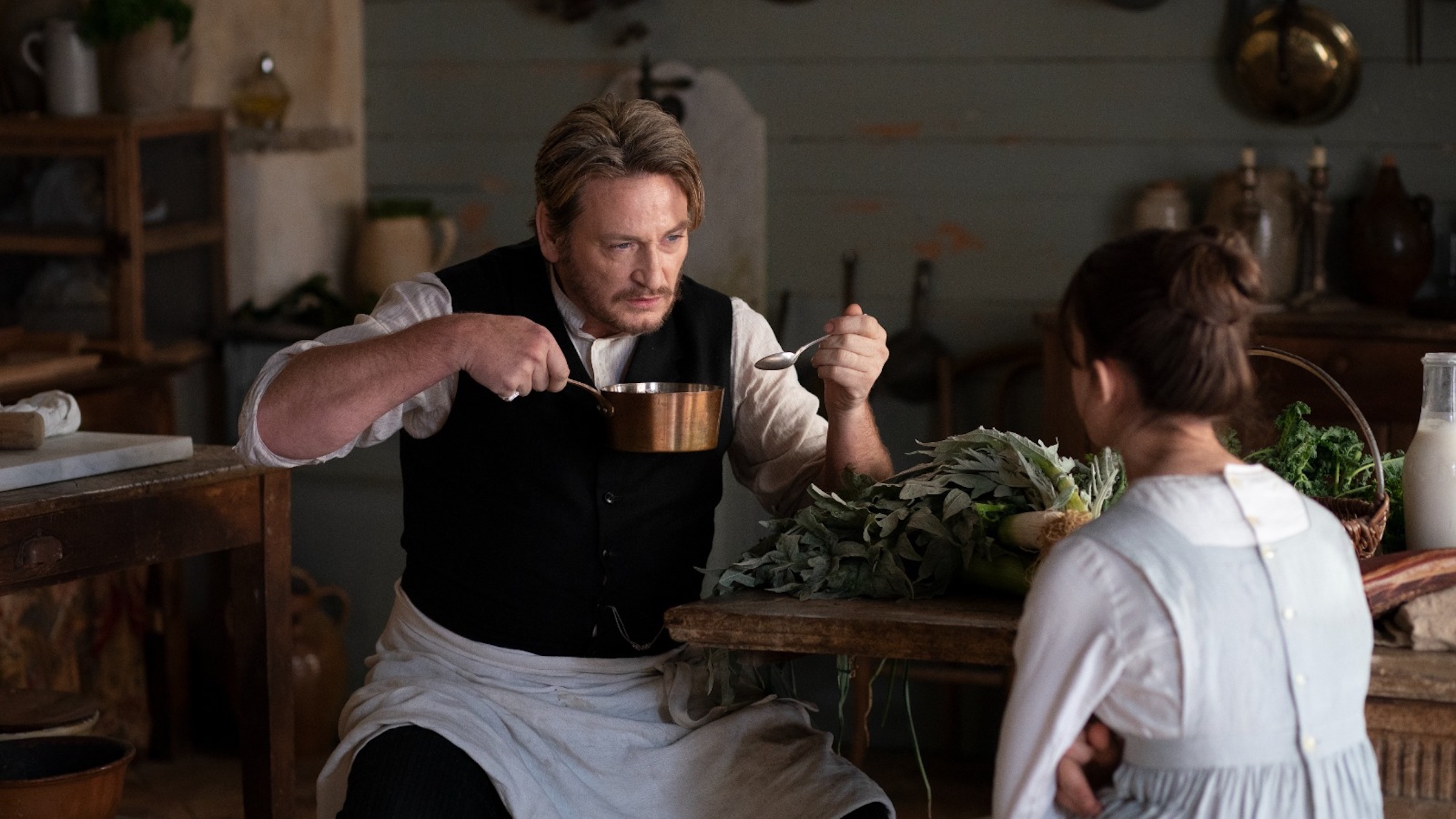
If Tran Anh Hung’s luminous period romance The Taste of Things had been released in 1985, it would have played for six months straight at your local arthouse cinema. Not that the film is a throwback; it’s simply blissfully restorative, a movie that gives you back something you didn’t realize you’d lost, one that might even make you forget what year you’re living in. Its pleasures run quiet and deep.
Juliette Binoche and Benoît Magimel play Eugénie and Dodin, a man and a woman living in a French country manor circa 1885. Dodin is a gourmet, a connoisseur of the subtle and myriad pleasures of food. Eugénie is Dodin’s cook, yet she’s so much more than that: a partner in crime who knows how to bring Dodin’s epicurean visions to life, a companion who enjoys talking and laughing with him, and sometimes a lover—but only on the evenings she chooses. Other nights, her door is locked, a definitive no that Dodin both accepts and respects. The rhythm of their relationship is as pastoral and orderly as the shifting of the seasons.
It's food that binds them close. In the movie’s extraordinary opening, Eugénie prepares a complex meal in the manor house’s spacious but simply appointed kitchen, helped by household servant Violette (Galatéa Bellugi), by Violette’s young niece Pauline (Bonnie Chagneau-Ravoire), a pint-sized gourmet in training, and by Dodin himself: he steps in to make one of the dishes, not in that annoying, self-aggrandizing “Here, let me help you” way, but in a manner that proves he’s fully in command of this task from start to finish. As sunlight and birdsong pour into the kitchen—the creation of this meal is a daylong task—Eugénie tenderly bastes a flat, regal turbot with milk, whisks a stately looking rack of veal from the oven not one second too soon nor a second too late, and lovingly ladles a creamy stew of seafood and vegetables into a hollowed-out puff pastry.
Read more: The 100 Best Movies of the Past 10 Decades

We’ll see this meal being served, course by course, to Dodin and four of his fellow aficionados, good-humored, well-mannered men whose vests barely button over their expansive stomachs. But even though she’s cooking for guests, there’s no stress in Eugénie’s kitchen, no hustle or bustle, no frayed nerves or flaring tempers; only when necessary does she give a word or two of instruction to her helpers. Elegant in her plain linen shirtwaist, she glides through the space in a well-choreographed ballet, never breaking a sweat. She’s been with Dodin for 20 years, and it’s no wonder he’s mad about her.
But when he broaches the idea of marriage, at least the first time, she demurs: she’s so comfortable in her skin, just as she is, that there’s something in her that resists the role of wife. What’s more, she suffers from occasional dizzy spells, moments of disorientation and possibly pain that she calmly accepts—this isn’t a good sign. The Taste of Things is a story of love between two people and love for food, set in a time before the loathsome term foodie—a word with a sneer built in, one that treats true appreciation for food as a kind of joke—became common parlance. But it’s also a movie about grief, about how the things that connect us to the earth—food foremost among them—can also connect us to the people we love best, such that we feel lost when they leave us.
Hung—who may be best known for films like Cyclo (1995) and The Scent of Green Papaya (1993)—used a 1924 novel by Marcel Rouff, La vie et la Passion de Dodin-Bouffant, Gourmet, as the inspiration for his screenplay, and the story has a root-vegetable simplicity. It’s the ideal showcase for these two lead actors who, incidentally, were once a couple themselves, and who have a child together. Binoche and Magimel play these two as mature humans who know their own minds; their intimacy is the amiable kind, springing not from neediness but from mutual regard. They also happen to be extraordinarily compelling as actors: Binoche, now in her late fifties, is snowdrop-radiant; Magimel is casually regal, handsome as a worn leather jacket. This is a movie about sensory pleasures—as the men swirl the wine in their glasses during their little dinner party, you can almost smell the oakiness of the barrel from which it came—and one of the greatest of those pleasures is looking at beautiful people for two hours and some change.

The Taste of Things is also just flat-out gorgeous to look at. When cinematographer Jonathan Ricquebourg shows us a sun-dappled garden planted with marching rows of greenery, the feel of the soil between your fingers is part of the imaginary sensation. As a stock is clarified in copper pot, steam whirls from the surface like an art nouveau dream. The light, indoors and out, has a buttery, Vermeer-like quality—if only you could bottle it and pour some out on a gloomy day. Hung goes for broke in setting the most lush, romantic atmosphere possible: a shot of a lustrous pear reclining on a dessert plate gives way to the vision of Binoche’s naked figure, curvy as a viola, glimpsed tastefully from behind as she reclines on her bed, waiting for Dodin’s touch. It’s such a corny segue that you can’t help laughing—I first saw the film with a mostly delighted audience at Cannes, and we all giggled like schoolkids at the audacity of it.
But then, why go to the movies at all if not to revel in their language? The things we call clichés are often really just conventions. The Taste of Things was France’s Oscar submission for Best International Feature Film, and though it failed to earn a nomination, it may have an even more distinguished future ahead. This is an elixir of love in movie form, the kind of date movie that will work the same kind of magic in 2025 as it would have in 1985. It’s the spirit of our arthouse past preserved forever, like a jar of antique French sunlight.
More Must-Reads from TIME
- Cybersecurity Experts Are Sounding the Alarm on DOGE
- Meet the 2025 Women of the Year
- The Harsh Truth About Disability Inclusion
- Why Do More Young Adults Have Cancer?
- Colman Domingo Leads With Radical Love
- How to Get Better at Doing Things Alone
- Michelle Zauner Stares Down the Darkness
Contact us at letters@time.com